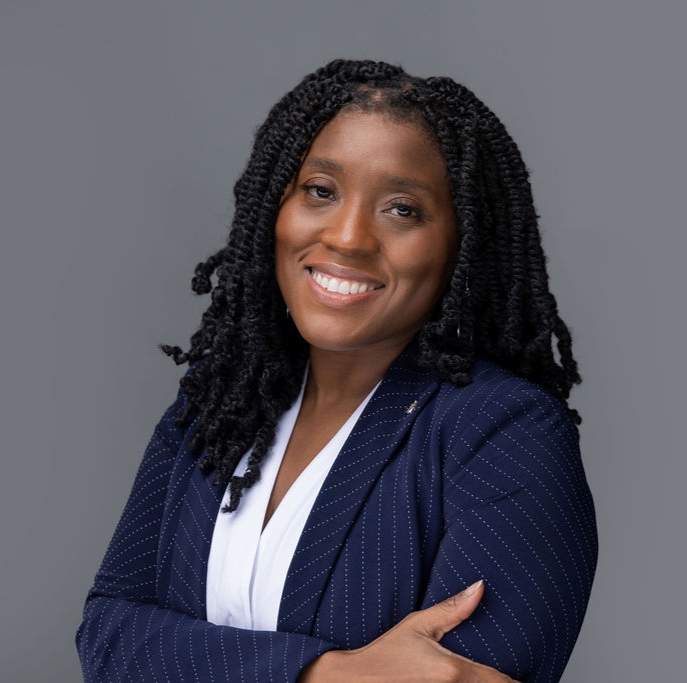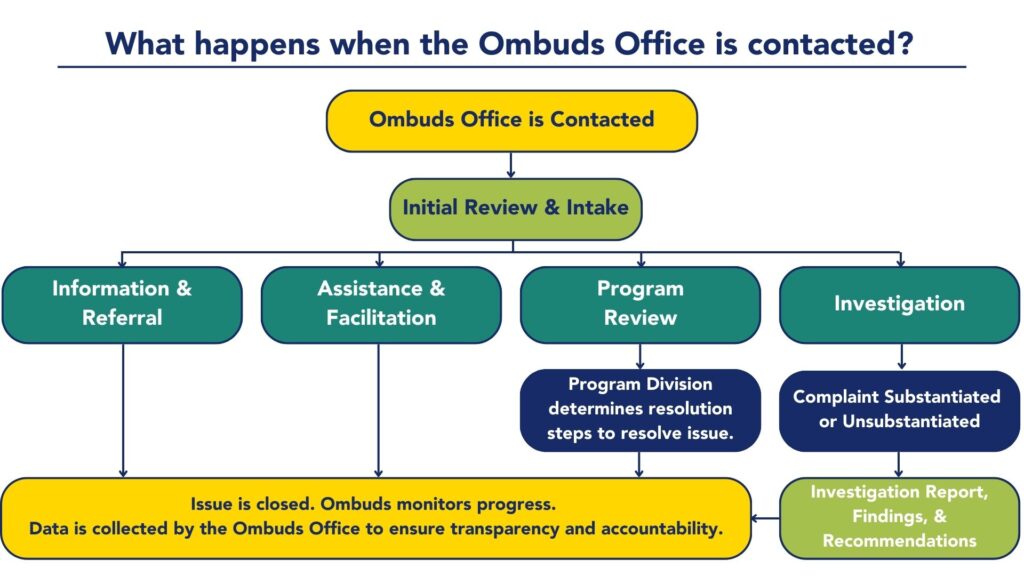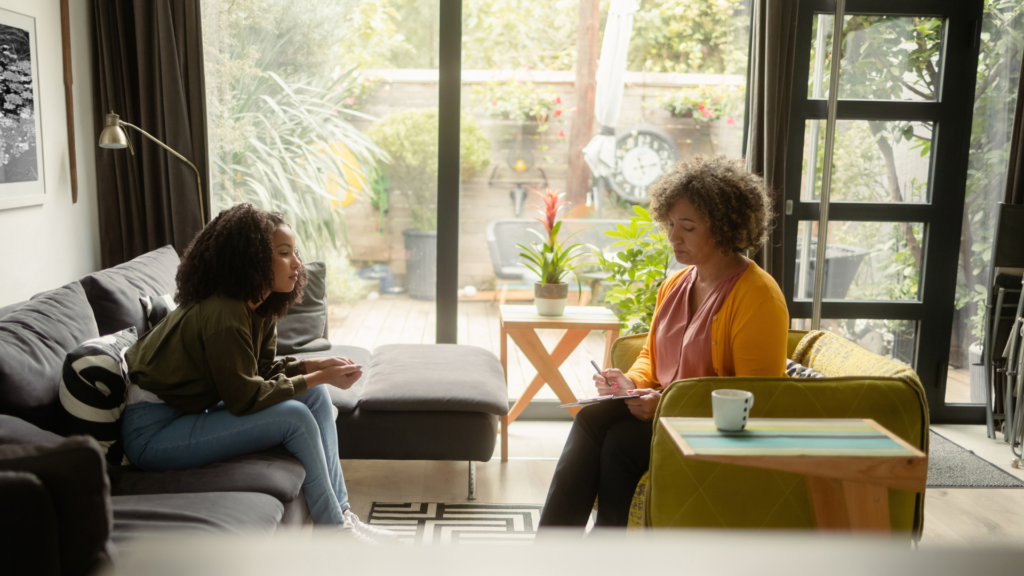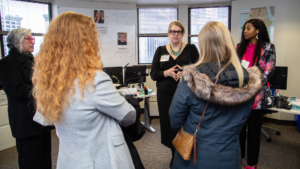Traditionally, an Ombuds office is an accountability mechanism for people to report complaints and concerns. Ombuds offices may be available at government agencies, schools and universities, and healthcare facilities. An Ombuds Office for homelessness response is rare—few cities have put one in place—but it is a valuable tool.
A vital function of the King County Regional Homelessness Authority’s Ombuds office is to improve the quality of services for people experiencing homelessness. The office helps community members navigate the homeless system, resolve issues, and proactively engage with the community to gather system feedback.
In this Q&A, Katara explains the Ombuds Office’s approach to accountability, centering lived experience, and engaging with the community.

What is the purpose of the Ombuds office?
Katara Jordan: The Ombuds Office was created to promote public confidence in KCRHA’s ability to serve people experiencing homelessness effectively, efficiently, and equitably. That essentially means the Ombuds Office is an accountability mechanism within King County’s homelessness response system, ensuring that constituents have access to a fair process.
The two main functions of the Office are to provide customer service and community engagement. The Ombuds provides customer service by listening to constituents’ concerns, resolving issues and complaints, and helping community members navigate the homeless response system. We actively engage with community members to provide information about our services and hear from the community about issues we should be aware of impacting the system.
The hope is that if we foster continued engagement with those who engage with the homeless response system and share what we learn with other system components, KCRHA and our system partners can plan thoughtful changes and improvements that will result in better service delivery and better outcomes for our community.
How and why does the Ombuds office hold the system accountable?
KJ: When I hear others in this space talk about accountability, it’s either in the context of “holding” the system, KCRHA, or providers accountable or defaulting to “restorative justice-like practices.” These feel simultaneously limiting, amorphous, and not the right fit for what we’ve been asked to do as a system.
I like Nate Regier’s concept of “Compassionate Accountability,” which he defines as “the process of building connections while getting results” toward an outcome, metric, or end state. This approach to accountability allows the Ombuds team to move beyond thinking about system accountability as punitive, adversarial, or a unilateral obligation. Instead, we view accountability as interdependent and collaborative. It is our role as Ombuds to remind the various components of our homelessness system, whether that be governance (KCRHA Implementation, Governing, and the Continuum of Care boards), government partners like cities or agencies, providers of homeless services, KCRHA staff, funders, businesses, neighborhood and community groups, and other partners that we all have a role to play in answering to the public and our constituents about how we are administering and delivering homeless services in alignment with our guiding principles.
How does the Ombuds office center lived experience?
KJ: The homeless response system, while its primary purpose is to serve those experiencing homelessness, hasn’t always provided a mechanism to engage with the people it serves. Our team engages with people with lived experience daily, interacting with our unhoused community neighbors and providers of services to learn about their experiences. This approach allows the Ombuds to learn from the voices and needs of the people most affected, which is crucial for ensuring a responsive and accountable system.
Our team recently had a conversation with Marvin Futrell, one of the Continuum of Care Co-Directors, and he explained our work as making the invisible visible. I love that description because it aligns very much with the concept of “fair process” that I discussed above. The Ombuds provides a space for people using homeless services to share their concerns, better understand decisions being made on their behalf, and speak to the problems they are experiencing navigating services.
We offer access to a fair process where a third party will review their concerns and walk alongside constituents in each step of this process, from submission to mitigation to closing out an incident. Additionally, we value the experiences our constituents share and use them to inform best practices and improve our system delivery for people with lived experience. Through our annual report, we aim to inform the public about the trends and patterns that community members are raising with the office.
How does the Ombuds office engage with the community?
KJ: The team engages with the community through various channels, including community events and conversations with organizations, providers, and constituents. While the team had limited capacity for community engagement in 2022 and 2023 due to a focus on responding to incoming requests, since August, the team has been fully staffed and plans to attend several regional events. In 2024, the Office plans to host several in-person and virtual events to allow constituents to learn about our services and share any concerns about how the homeless response system is operating.

What are the types of complaints the Office receives?
KJ: Most of the requests we receive are related to helping people find homeless services. However, we also receive complaints which account for approximately 19% of our contacts. These complaints cover a range of issues, including staff mistreatment, living conditions in shelters, inadequate case management, unfair exits, delays in receiving services, and other concerns that may fall outside our scope. Our goal is to provide a fair process for addressing these complaints and work collaboratively with system partners to improve service delivery and outcomes for those experiencing homelessness.
How many people work in the Ombuds office, and what are their roles?
KJ: The Ombuds Office is a team of five that includes me, our Deputy Ombudsperson, Raphael Hartman, and our three Ombudspersons, Merylin Castelan, Mary Dunbar, and Em Ishiki.
What attracted you to this role?
KJ: My entire career has been dedicated to public service. Most of it has been focused on supporting children, youth, and families experiencing homelessness while navigating adjacent systems like the public school system. While my work in that regard was rewarding, it felt incomplete. I wanted to understand the homeless response system and its challenges so that I could be more effective in helping other systems, like the education system or the mental health system, understand the role they play in working alongside the homeless response system to prevent people from becoming homeless.
Since I began this work twelve years ago, my response has been the same – I want to help. I like accessing and sharing information so people can make informed choices about what’s best for their situation.
I genuinely believe that King County can create a well-functioning homeless response system and serve as a model for other places in the country. An Ombuds Office plays a role in contributing to a well-functioning system because it acknowledges that the voices and experiences of the people involved in the system matter. As my colleague Raphael Hartman has shared with our team, we need a system that doesn’t put the burden on people to find services, but the system itself bears the burden and responsibility of helping people access dignity-centered services to transition out of homelessness. I’m not under any illusion that this will happen overnight or that we will find the perfect solution, but I do believe we can work together effectively as a community to ensure as many people as possible are housed.
I feel honored and humbled to be in this role and to lead an incredible team that is genuinely passionate about serving our unhoused neighbors and working alongside homeless service providers, who are the cornerstone of our system.
If you need help from the KCRHA Ombuds Office, please fill out this form, call 206.639.4601 or send an email to ombuds@kcrha.org.



